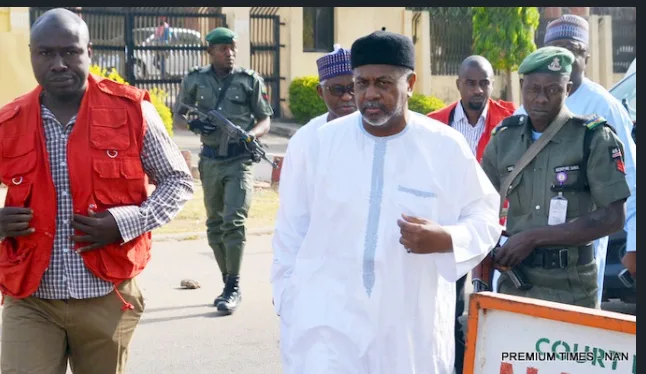Dasuki’s 10-Year-Old Corruption Trial Nears Final Stretch as Court Sets Deadline for EFCC
By Parrot Newsroom
After a decade of twists, delays, and courtroom drama, the long-running corruption trial of former National Security Adviser, Mohammed Sambo Dasuki, is finally heading towards its climax.
In a move to inject momentum into the sluggish case, Justice Peter Lifu of the Federal High Court in Abuja has granted the Economic and Financial Crimes Commission (EFCC) just three days—July 7, 8, and 9, 2025—to wrap up its prosecution. The case, originally filed in 2015, has dragged on for ten years, with restarts, objections, and procedural hurdles stalling progress.
At the latest hearing, the courtroom witnessed fresh arguments over a subpoena issued back in May 2018 to the Department of State Services (DSS). The EFCC wants to tender evidence obtained during searches on Dasuki’s various properties in Abuja and Sokoto. However, Dasuki’s legal team, led by A. A. Usman, challenged the legality of the subpoena, claiming that the DSS is not a legally recognized entity under Nigerian law.
The EFCC’s counsel, Oladipupo Okpeseyi, wasn’t having it. He fired back, arguing that the DSS, officially known as the Department of State Security, is indeed a creation of statute and that no confusion existed about its identity.
“The document was duly served on the Department of State Security. There is no ambiguity. The witness knew exactly who he was dealing with. Technical objections shouldn’t derail the pursuit of justice,” Okpeseyi insisted.
Justice Lifu agreed—at least for now.
While noting that admissibility is based on relevance under the Evidence Act, he decided to accept the subpoenaed document as an exhibit. However, rather than issuing an immediate ruling on the objection, the judge said he would address it in the final judgment.
Importantly, Justice Lifu did not hide his frustration with the pace of the trial. “This case has been in the docket for ten years. The Administration of Criminal Justice Act (ACJA) 2015 was created to avoid precisely this kind of delay,” he noted sternly.
At this same proceeding, the EFCC presented its first witness, Monsur Mohammed, an exhibit keeper from the DSS. He testified about several searches conducted on Dasuki’s homes in Abuja and Sokoto in July 2015. Four search warrants were executed, and several items were retrieved from:
13 John Khadije Street, Asokoro, Abuja
46 Nelson Mandela Street, Asokoro, Abuja
Sabon Birnin Road, Sokoto
Sultan Abubakar Road, Sokoto

But here’s the twist: none of the items were incriminating.
Despite the weighty accusations that initially accompanied Dasuki’s arrest—ranging from alleged mismanagement of security funds to unlawful possession of firearms—the DSS witness admitted that nothing linking Dasuki directly to a crime was found during the property raids.
With that, the court adjourned, and all eyes now shift to July, when the EFCC is expected to finally close its case—10 years after it began.
Justice Lifu made it clear: no more delays. “The learned prosecutor is expected to close his case on these adjourned dates,” he declared.
Will this July finally bring closure to one of Nigeria’s most prolonged high-profile corruption trials? The country watches—again.

